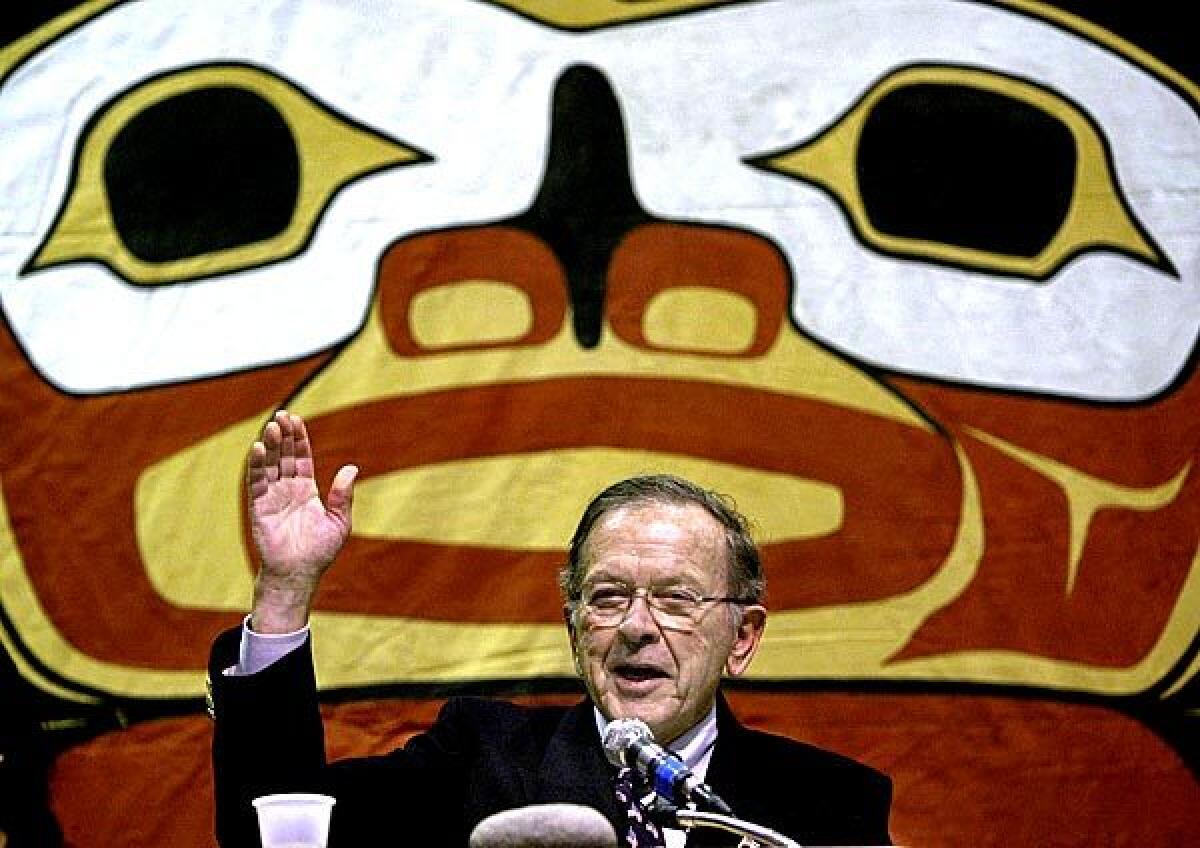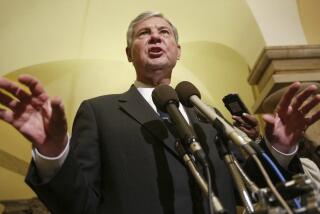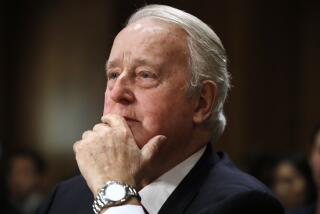Ted Stevens dies at 86; Alaska’s U.S. senator for 40 years

Former Sen. Ted Stevens, 86, who died in a plane crash Monday, was a brusque political patron who dominated Alaska’s transformation from wild frontier to modern state until he became entangled in corruption charges.
Stevens was the longest-serving Republican in Senate history and an unrivaled federal benefactor for his state when his political career came to a stormy end less than two years ago. After 40 years in office, the senator narrowly lost a bid for reelection in 2008, one week after he was convicted in a federal corruption trial.
A judge later tossed out the verdict and accused prosecutors of misconduct. But the episode had already cut short a political reign built on the power of a senior senator to control the federal purse and the force of a personality unafraid to use it.
“My motto has been … to hell with politics. Do what’s right for Alaska,” Stevens said as he left the Senate.
Stevens, who served as chairman of the powerful Appropriations Committee from 1997 to 2005 and wielded enormous influence as the ranking minority member when Democrats controlled the Senate, funneled billions in federal funding to infrastructure projects and development efforts in Alaska.
He saw himself as the primary defender of a faraway and misunderstood state, a place unusually dependent on federal dollars and decisions. His work secured money for schools, roads and hospitals, earning him the moniker “Uncle Ted.” Federal spending in the state became known as “Stevens money.”
“When I was 10 years old, he was the United States attorney in Fairbanks and his name was in the paper all the time. Now I’m receiving Social Security, and his name is still in the newspaper all the time.… He has had an effect on every major public policy in Alaska for the last 50 years,” said Michael Carey, a longtime columnist for the Anchorage Daily News.
“Ted Stevens was not a reformer. You will not find his name on any reform bills. He was a man who took the world as he found it … and he found it a very hard place. He grew up believing the world is a place for people willing to fight for what they get, and that’s what he did.”
In 2000, the state Legislature named Stevens “Alaskan of the Century.” That same year the state received more money per capita than any other, making the senator the target of budget watchdogs from within his own party.
Stevens fought successfully for the Alaska oil pipeline, a boon to the state economy. He helped push through the Native Claims Settlement Act, winning compensation and millions of acres of land for indigenous communities. He protected the state’s fisheries by supporting a ban on many foreign-owned ships in Alaskan waters.
One project Stevens backed — for a bridge to a sparsely populated island — became known as the “Bridge to Nowhere” and a symbol of government waste.
But Stevens, a compact man whose face wore a permanently dour expression, was rarely cowed by critics. After a 2003 Times investigation detailing how Stevens had amassed personal wealth by investing with businessmen he helped in Washington, the senator called those seeking his resignation “crazy.”
As he took the helm of the Senate Appropriations Committee in 1997 after Republicans gained the majority, he boasted that a new sheriff was in town.
“I’m a mean, miserable SOB,” he reportedly told colleagues.
“Ted was a force to be reckoned with, and we will miss him greatly,” Republican Sen. Mitch McConnell, the minority leader from Kentucky, said in a statement. “In the history of our country, no one man has done more for one state than Ted Stevens.”
Stevens often took on environmentalists over oil and gas development and conservation issues. He was a leading proponent of attempts to open up part of the Arctic National Wildlife Refuge to oil drilling. He was a strong supporter of military spending and, after a bout with prostate cancer, he directed money into cancer research.
Stevens was known for forging bipartisan relationships, including a close friendship with Hawaii Democrat Sen. Daniel Inouye. The men saw similarities in the way their states could be overlooked, and both had distinguished records of service in World War II.
“I have lost my brother,” Inouye said in a statement Tuesday.
President Obama also extended condolences. “A decorated World War II veteran, Sen. Ted Stevens devoted his career to serving the people of Alaska and fighting for our men and women in uniform,” the president said.
Stevens was president pro tempore of the Senate in 2003 when he came under fire for a series of personal investments with people and companies that directly benefited from his work in the Senate.
He directed a $450-million contract to an Anchorage businessman who made Stevens a partner in a profitable real estate venture. A company that Stevens helped create won millions in defense contracts. The senator, who after a lifetime of public service had never accumulated wealth, became a quick millionaire.
Stevens defended himself by citing his long record. “I have helped Alaskans without regard to race, religion, sex, party, financial circumstances, where they lived — literally without qualification,” he said.
Ethics accusations reached Stevens again five years later, when a sweeping political corruption investigation rocked Alaska politics. Stevens was eventually charged with seven counts of making false statements on his Senate financial disclosure forms.
Prosecutors said he failed to report more than $250,000 in upgrades to his Alaska home, as well as a gas grill and a new Land Rover, paid for by executives of VECO Corp., an oil field services company.
Stevens pleaded not guilty and rejected a plea deal. His lawyers argued that he was unaware of the gifts and others, including his wife, were responsible for overseeing the renovations and paying the bills.
Stevens was found guilty; analysts said his pugnacious performance on the witness stand had not helped him.
As he left the Senate in November 2008, Stevens vowed to fight the conviction. Five months after the conviction, Atty. Gen. Eric Holder voided the indictment and declined to hold a new trial.
Theodore Fulton Stevens was born in Indianapolis on Nov. 18, 1923. His parents divorced when he was 6 and Stevens moved among family members, eventually landing with an aunt and uncle in Manhattan Beach.
After graduating from Redondo Union High School, Stevens flew cargo planes for the U.S. Army Air Forces during World War II on the dangerous supply route over the Himalayas known as “the Hump.” He won two Distinguished Flying Crosses and two Air Medals, according to campaign biographies.
He later graduated from UCLA and earned a law degree from Harvard in 1950.
Stevens moved to Fairbanks, Alaska, in 1953 to practice law. He became federal prosecutor and later held various posts at the Department of Interior in Washington. He became known as a leading advocate for Alaska statehood, which was achieved in 1959. He returned to Alaska and won a seat in the state House of Representatives in 1964.
Stevens made two unsuccessful bids for the U.S. Senate before being appointed to the seat in 1968, following the death of political ally Sen. Bob Bartlett. He would become the seventh-longest-serving senator in United States history, often winning elections with more than two-thirds of the vote.
In 1978, Stevens and his wife, Ann, were traveling in a Learjet that crashed while landing at Anchorage Airport, which was later renamed for him. His wife, with whom he had five children, was killed. The senator was one of two survivors. He later married Catherine Chandler, a lawyer and lobbyist, and had another daughter.
Stevens is survived by his wife, six children and grandchildren.
khennessey@tribune.com
Times staff writer Kim Murphy in Seattle and Michael Memoli in the Washington bureau contributed to this report.
More to Read
Start your day right
Sign up for Essential California for the L.A. Times biggest news, features and recommendations in your inbox six days a week.
You may occasionally receive promotional content from the Los Angeles Times.







